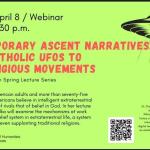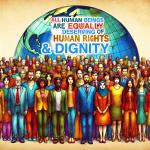 I remember, as an undergraduate, reading Spinoza for the first time. I came across the sentence, “The free man thinks of nothing less than death.” Spinoza meant, of course, that a free man never thinks about death.
I remember, as an undergraduate, reading Spinoza for the first time. I came across the sentence, “The free man thinks of nothing less than death.” Spinoza meant, of course, that a free man never thinks about death.
But I managed to read the sentence in the opposite way. I took the phrase “nothing less” in the way you might say, “I want nothing less than the best cheesecake in the state.” I thought Spinoza was saying that the free man demanded the very best to think about. Death, obviously, tops that list.
I took it for granted that everyone thinks about death almost all of the time. On becoming a Catholic in my adulthood, I was excited by the prospect of joining the morbid parade of suffering souls trudging stolidly toward the grave, fingering our rosaries and muttering under our breath about the veil of tears.
One small virtue of Catholicism, to my mind, is that we still read Ecclesiastes.
This is an evil among all things that are done under the sun, that there is one event unto all: yea, also the heart of the sons of men is full of evil, and madness is in their heart while they live, and after that they go to the dead.
What then, of this talk of everlasting life? What about the kingdom of heaven and the eternal bliss of the afterlife?
“One of my problems with Christianity,” Christian Wiman wrote in his book My Bright Abyss: Meditation of a Modern Believer, “is that all talk of heaven seems absurd to me, though I believe that we have souls and that they survive our deaths, in some sense that we are entirely incapable of imagining (‘Imagine a Carthage sown with salt…’).”
The line about imagining a Carthage sown with salt is from Marilynne Robinson’s Housekeeping. She writes about a field of salt giving birth to a vegetable profusion that grows from rime and brine. That’s to say, something impossible happens, something we are incapable of imagining.
The triumph in the way that Marilynne Robinson writes about death, the afterlife, the end of time, is that the words border on the absurd. Fields of salt giving birth to strange crystalline trees. The world made whole again by salt calyxes opening into prisms.
It is not, it can’t be, that the life we know is going to continue on after the brief pause of our own deaths. It can’t be that. Because thinking it through, that would be the very definition of hell.
But that is the very thing we desire. We want to die without really dying. We want to lose ourselves only to somehow, magically, regain ourselves again on the other side. We want to become one with God, just as we’ve been promised, but we want to pretend that becoming one with God doesn’t mean a burning away of everything we’ve come to know as self.
“Whatever sense belief makes of death, it has to incorporate its self-evident reality, not deny it.” That’s what Francis Spufford wrote in Unapologetic: Why, Despite Everything, Christianity Can Still Make Surprising Emotional Sense. He continues:
And again, in my experience, belief makes the problem harder, not easier. Because there death is, real for us as it is for everyone else, and yet (as with every other outrage of the cruel world) we also have to fit it together somehow with the intermittently felt, constantly transmitted assurance that we are loved.
The problem of death doesn’t go away with Christianity. We are not promised immortality. Immortality is a kind of blasphemy, a refusal to accept the condition of mortal life, which is death. Real death. Not pretend, temporary death.
In real death, we give our lives totally and completely to God, to the beyond. What does that mean? We can’t possibly know, or else it wouldn’t be real. It wouldn’t be death.
Those last few sentences seem, after some reflection, too strident. I want to have faith in the face of death, and I don’t know how to do that. That’s the simple fact of it.
I was pleased to discover that in the preface to his new collection of essays, (Loitering, TinHouseBooks) Charles D’Ambrosio quotes Patricia Hampl on Augustine. Augustine wonders in his Confessions whether it is possible to call upon God before knowing him. Hampl writes (and D’Ambrosio quotes):
The assumption here is that faith is not to be confused with certainty; the only thing people can really count on is longing and the occult directives of desire. So, Augustine wonders, does that mean prayer must come before faith? Illogical as it is, perhaps not-knowing is the first condition of prayer, rather than its negation. Can that be?
To add pleasure to pleasure, this seems to be exactly what Marilynne Robinson is getting at in the passage in Housekeeping, the one that Christian Wiman quoted in his own book of tortured meditations on belief.
“For a wish for a hand on one’s hair is all but to feel it,” wrote Robinson: “So whatever we may lose, very craving gives it back to us again. Though we dream and hardly know it, longing, like an angel, fosters us, smooths our hair, and brings us wild strawberries.”
Maybe I was wrong, then, about what we get and don’t get. Maybe, in trying to face the hard, flat truth of death without the comfort of a sentimentalized Christianity, I am still, in a sense, claiming to know what I cannot know. What I am asked to do instead is to desire, to ask, openly and without benefit of self-protection.
I am willing to die, God, I think, as best I can as a good Christian. But I want some wild strawberries.
Morgan Meis is the critic-at-large for The Smart Set (thesmartset.com). He has a PhD in Philosophy and has written for n+1, The Believer, Harper’s Magazine, and The Virginia Quarterly Review. He won the Whiting Award in 2013. Morgan is also an editor at 3 Quarks Daily, and a winner of a Creative Capital | Warhol Foundation Arts Writers grant. A book of Morgan’s selected essays can be found here. He can be reached at morganmeis@gmail.com.















